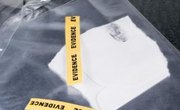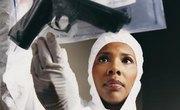A criminal profiler applies analytical skills in a criminal investigation to identify behavioral or personal characteristics of an unknown offender. If you have excellent research, problem solving and analytical skills, you can pursue a career as a criminal profiler. While there is no job position called "criminal profiler," the Federal Bureau of Investigation employs special agents to conduct criminal profiling. Certain educational qualifications prepare you for a career as a profiler.
Criminology
Criminology classes expose you to the world of crime, including types of crime, victims and offenders. You learn about theories on criminal behavior, mentality of criminals, society’s perspective on crime and polices on crime. Criminology exposes you to legal procedures in police stations, courts and prison when dealing with criminals. The course also covers the measurement of criminal activity and its results in a society. Criminology provides you with a better understanding of criminals and the policies and procedures followed by administrators of justice.
Forensic Psychology
Forensic psychology teaches you how to apply natural sciences to legal matters. The course includes studies in biology, criminalities, chemistry, calculus and toxicology. Coursework covers both science and law, allowing you to learn how to apply scientific knowledge in handling criminal cases. The legal perspective of forensic psychology teaches you how to interpret data and explain it to other investigators or the court in a manner that fulfills all legal requirements such as admissibility and credibility.
Behavioral Science
Behavioral science helps you understand human behavior. This is essential in criminal profiling because you have to analyze behavioral characteristics to identify an unknown criminal. The course looks at biological and social aspects that govern human behavior. You identify personality traits by evaluating data on human behavior. Good communication skills are essential in understanding human behavior and useful in circumstances such as crisis management or conflict resolution. Behavioral science nurtures communication skills and teaches you how to apply the skills to discover aspects of human behavior.
Research Methods
The work of a profiler involves evaluation of crime scene evidence, case photos and research on materials involving past crimes. Classes on scientific research methods equip you with proper research, analytical and deductive skills. Lessons include effective research methods such as experiments, hypothesis testing, surveys and data analysis. You also learn about the ethics expected of you during research so as not to compromise the accuracy and reliability of your findings.
Related Articles
References
Writer Bio
Maria OCadiz has been writing professionally since 1982, most recently publishing for various websites on topics like health and wellness, and education. She holds a Master of Arts in Education. She is a former university professor, curriculum facilitator and teacher.










